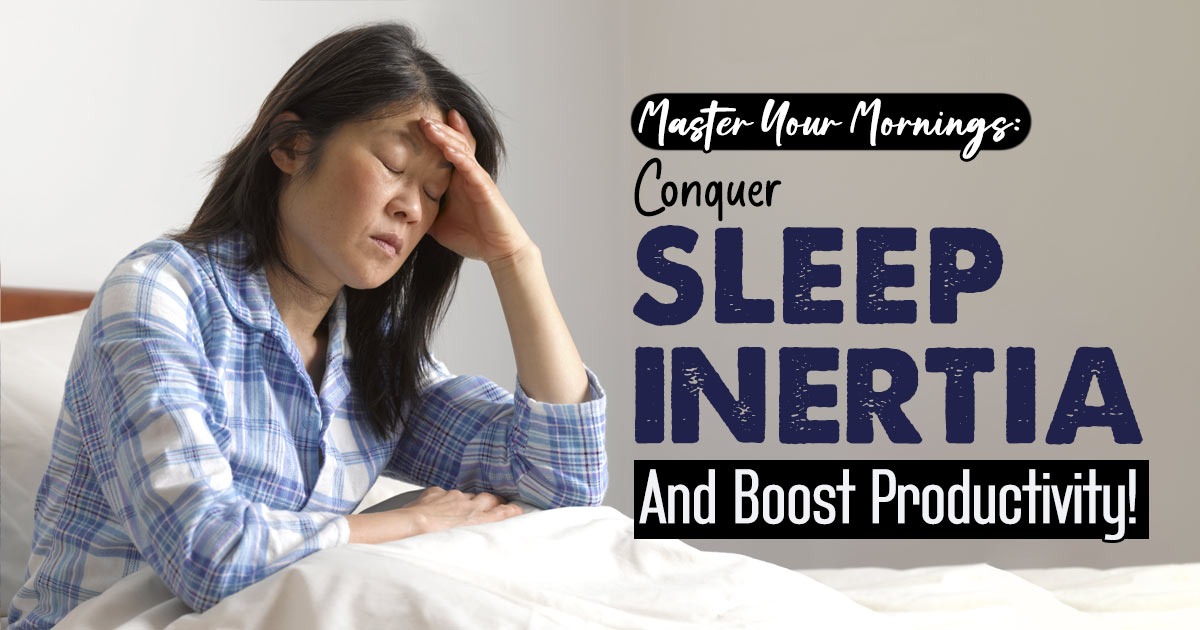Sleep inertia is when a person feels of being groggy and disorientated after waking up from a deep sleep. This can affect the mental health being of an individual. This condition may occur, for example, when a person is awakened abruptly from a deep slumber such as by an alarm clock or if he/she is woken up during the middle of a sleeping cycle.
It can bring about confusion, drowsiness, and decreased cognitive tasks performance. Generally, sleep inertia lasts between minutes and hours depending on individuals and their awakening system.
Signs Of Sleep Inertia
Some symptoms of sleep inertia are seen when one wakes up abruptly from sleep. These may involve experiencing sluggishness, feeling lost and generally confused. On the other hand, it could be difficult for somebody to fully wake-up, become alert, lose concentration and not think straight while doing cognitive tasks.
Physical signs too could be present in individuals experiencing sleep inertia, including stiff muscles, headaches and tiredness in general. All these factors have a great effect on how one would perform his/her daily chores, additionally affecting their physical and mental well-being.
Causes Of Sleep Inertia
Sleep inertia results due to various reasons, although all these link back to the timing of waking up and the sleep cycle itself. Sleep inertia happens when someone is suddenly awakened midway through their deep slumber instead of waking naturally at the end of it. As a result, natural rhythms in the body are interrupted, followed by feelings of listlessness or disorientation.
A lack of proper rest makes it even harder for someone to rise up fully awake in the morning hours. Other causes of sleep inertia include:
- Insufficient rest patterns which entail irregular schedules that disrupt normal rhythms.
- Sleeping disorders that affect both the quality and quantity of restful slumbering—hence finally influencing how refreshed one wakes up after having taken some part in conscious events.
Mental Health Impact Of Sleep Inertia
Sleep inertia can result in an irritable person with poor moods and inability to control their feelings. Additionally, sleep inertia leads to poor interpersonal relationships and coping strategies when dealing with stress or daily life challenges.
Also, the cognitive function of a person suffering from sleep inertia is affected such that it becomes difficult for him/her to attend or concentrate on anything, make decisions, or undertake tasks that require reasoning. Consequently, this may lower self-esteem and productivity levels at home, in school, or work places.
Addressing Sleep Inertia For Mental Health
Addressing sleep inertia with a series of healthy coping strategies is crucial in promoting mental wellness and overall health. Among them is establishing a regular bedtime and prioritizing adequate hours of sleep each night. This would assist in regulating the body’s internal clock as well as enhancing more restful and revitalizing slumbering patterns. It is important to create a calming environment before going to bed which will be comfortable enough to promote restful nights’ sleep.
Additionally, avoiding all stimulating activities and electronic devices before sleep may be helpful, as they can disrupt the body’s natural sleep patterns. Also, one should have good sleep hygiene by avoiding caffeine and alcohol just before going to bed and exercising regularly to improve quality of sleep.
In case these efforts are not effective in getting rid of sleep inertia, then consulting a healthcare professional helps to eliminate underlying sleep disorders or other medical conditions that might contribute to the problem.
Sleep inertia is commonplace and it has serious implications on a person’s mental health and wellbeing. It makes people feel tired, experience confusion, and take to poorly performing cognitive tasks that affect their moods, cognition and overall wellness. Therefore, addressing this condition is crucial for maintaining good mental health and well-being.



